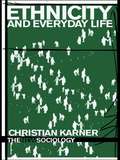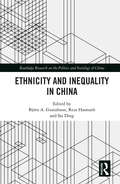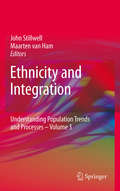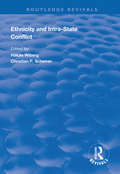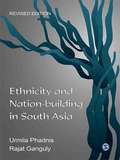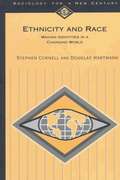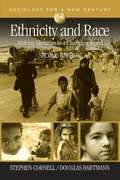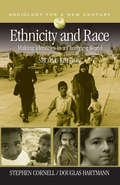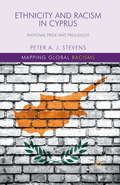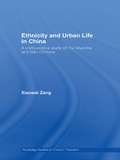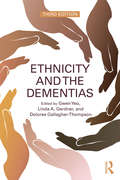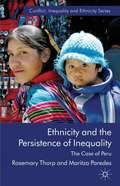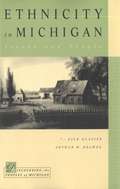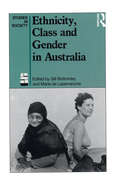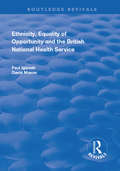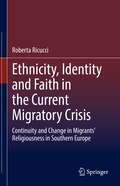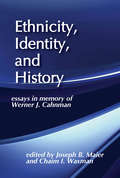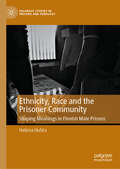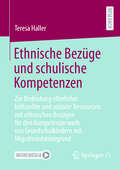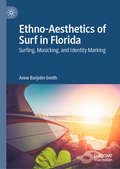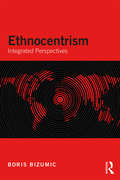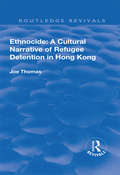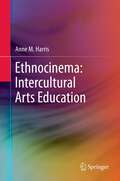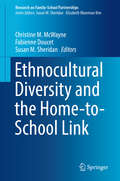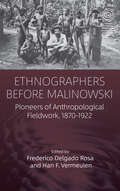- Table View
- List View
Ethnicity and Everyday Life (The New Sociology)
by Christian KarnerMixing theories of the everyday with a wide range of case studies, this book explains the 'character' of ethnicity, from being a political tool of exclusion, to a source of meaning and solidarity, and the relationship between culture, power and identity. Combining theories of the everyday with empirical case studies, this book examines: the 'dual character' of ethnicity – as a political tool of exclusion and source of meaning/ solidarity respectively the relationship between culture, power and identity the significance of historical/socio-economic contexts to ethnicity and everyday life. This book addresses many important questions through a critical application of theories of the everyday to a series of case studies that include travellers, the South Asian diaspora, contemporary Austria, and asylum seekers in 'Fortress Europe'. This book provides an accessible and coherent introduction to the sociology of ethnicity and will be essential reading for undergraduate students on cultural studies, race and ethnic studies, and sociology courses.
Ethnicity and Inequality in China (Routledge Research on the Politics and Sociology of China)
by Reza Hasmath Bjö A. Gustafsson Sai DingThis book analyses the behaviour of ethnic minority groups in China using the first comprehensive national dataset dedicated to capturing the socio-economic profile of ethnic minorities: the China Household Ethnicity Survey (CHES). Managing ethnic diversity in China has become an increasingly important subject, especially against the backdrop of the nation’s rampant economic growth and changing institutional behaviour. The book has an analytical interest in looking at the benefactors of China’s growth from an ethnic group dimension, and notably, how the economic life of the 55 ethnic minority groups compares to the Han majority. It’s one of the first publications to capture the heterogeneity of ethnic minority groups’ socio-economic experience, through intersectional analysis and multi-disciplinary approaches. Contributing factors in explaining ethnic minorities’ experiences in the urban labour market are also considered: from how linguistic capital and migration patterns vary for ethnic minorities, to the effects of pro-rural policies. Underpinning these are questions about the extent to which happiness and discrimination impact the economic life of ethnic minorities. Ethnicity and Inequality in China will prove an invaluable resource for students and scholars of economics, sociology and contemporary Chinese Studies more broadly.
Ethnicity and Integration
by John Stillwell Maarten Van HamThe theme of this volume is ethnicity and the implications for integration of our increasingly ethnically diversified population, with topics covering demographics and migration of ethnic groups, measures of integration or segregation, health and labour market characteristics, ethnicity and crime and ethnic population projections.
Ethnicity and Intra-State Conflict: Types, Causes and Peace Strategies (Routledge Revivals)
by Christian P. Scherrer Håkan WibergPublished in 1999, this text examines domestic wars, looking at inter-state relations only in as far as they are directly relevant to understand such wars. The book aims to indicate how intra-state war differs from the inter-state war, and focuses primarily on such domestic armed conflicts that at least have significant ethnonational components. The book assesses how heterogeneous a category "ethnic conflict" is in terms of causes and consequences, and gauges the complex interplay between class, regionalism and ethnicity. It is not limited to description and causal analysis, but also attempts to assess suggestions as to what types of actors may contribute in what ways to avoiding ethnonational mobilization/polarization, avoiding militarization of manifest conflicts, and de-escalating militarized conflicts by looking for tenable generalizations on what types of approaches are fruitful in bringing about de-escalation, ceasefires, political compromises, peaceful division or peaceful integration, reconciliation.
Ethnicity and Nation-building in South Asia
by Rajat Ganguly Urmila Phadnis'This is probably the only work that deals with the entire spectrum of South Asian ethnicity and its dynamic role in regional politics. A decade and a half later after the first edition was published, the work has become even more relevant because ethnic divisions have become sharper all across the region. This updated second edition is thus welcome' - Rajeswari Pillai Rajagopalan, Contemporary South Asia First published in 1989, this widely hailed core text of the dynamics of ethnic identities and movements in the South Asian region is perhaps even more relevant today, as the region faces a resurgence of ethno-nationalist sentiments and the outbreak of new ethnic conflict. Among the features of this thoroughly revised edition are: - it provides a critical appraisal of various theoretical approaches to the study of ethnicity and nation-building - delineates the ethnic composition of the South Asian Region - examines the specific state structures of the countries studied: India, Pakistan, Bangladesh, Sri Lanka, Nepal, Bhutan and the Maldives - discusses various ethnic movements in these countries - covers the most recent developments in the region
Ethnicity and Race: Making Identities in a Changing World
by Douglas Hartmann Stephen E. CornellEthnicity and Race uses extended case studies from all over the world to craft a compelling, even-handed account of the power and persistence of ethnicity and race in the world.
Ethnicity and Race: Making Identities in a Changing World
by Douglas Hartmann Stephen CornellCornell (sociology, U. of Arizona) and Hartmann (sociology, U. of Minnesota, Minneapolis) present an updated edition of their textbook for advanced undergraduate courses on race and ethnicity in the departments of sociology, ethnic studies, global studies, and anthropology. Revised throughout with new illustrative or empirical materials and updated references, the text includes new discussion of assimilation, the invisibility of racial dominance, and paradigms and analytical frames for understanding group relations, and a new case study on race, culture, and belonging in contemporary France. Annotation ©2007 Book News, Inc., Portland, OR (booknews.com)
Ethnicity and Race: Making Identities in a Changing World
by Douglas Hartmann Stephen E. Cornell"This book is very well written and clearly organized throughout. It is pitched at upper-level undergraduate and graduate-level race and ethnicity students...in sum, this is an important book, highly recommended to students and faculty alike. The authors draw extensively from classic and contemporary sociological theory throughout the text and maintain a transnational focus in each and every chapter." —TEACHING SOCIOLOGYEthnicity and Race: Making Identities in a Changing World, Second Edition uses examples and extended case studies from all over the world to craft a compelling, even-handed account of the power and persistence of ethnicity and race in the contemporary world. Known for its conceptual clarity, world-historical scope, and fair-minded treatment of these oft controversial topics, this updated and expanded edition retains all of the core elements and constructionist insights of the original.
Ethnicity and Racism in Cyprus: National Pride and Prejudice? (Mapping Global Racisms)
by P. StevensInvestigating the relationship between ethnic pride and prejudice in the divided community of Cyprus, this book focuses on the ethnic stereotypes that Greek and Turkish Cypriot secondary school students develop of each other and other ethnic groups in Cyprus.
Ethnicity and Urban Life in China: A Comparative Study of Hui Muslims and Han Chinese (Routledge Studies on China in Transition #7)
by Xiaowei ZangThis much-needed work on ethnicity in Asia offers a major sociological analysis of Hui Muslims in contemporary China. Using both qualitative and quantitative data derived from fieldwork in Lanzhou between March 2001 and July 2004, it looks at the contrast between the urban life of the Han people, the ethnic majority in the city of Lanzhou, and the Hui people, the largest ethnic minority in the city, and assesses the link between minority ethnicity and traditional behaviour in urban sociology and research on ethnic groups of China. In-depth interviews and survey data provides a fresh perspective to the study of ethnic behaviour in China, and offers a rich account of Hui behaviour in seven aspects of urban life: neighbouring interaction, friendship formation, network behaviour, mate selection methods, spouse choice, marital homogamy, and household structure. Contributing to the global discourse on Islam, religious fundamentalism and modernity, this book will be invaluable to anyone interested in Chinese society, Islam, religion, development, urban studies, anthropology and ethnicity.
Ethnicity and the Dementias (Third Edition)
by Gwen Yeo Linda A. Gerdner Dolores Gallagher-Thompson<p>In recent years, the literature on the topic of ethnic and racial issues in Alzheimer’s disease and other dementias has increased dramatically. At the same time, the need for cultural competence in all of geriatric care, including dementia care, is increasingly being acknowledged. Dementia is a large societal problem affecting all communities, regardless of race or ethnicity, and understanding dementia for specific groups is tremendously important for both clinical knowledge and for health planning as a nation. <p>This third edition of Ethnicity and the Dementias offers invaluable background information in this area, while also examining how those suffering from dementia and their family members respond or adapt to the challenges that follow. Thoroughly updated and revised throughout, the book features contributions from leading clinicians and researchers in the field, with particular attention given to genetic and cultural factors related to dementia, effective prevention and treatment strategies, and issues in caregiving and family support. Chapters offer specific recommendations for dementia care in 11 ethnic/racial groups, as well as suggestions for working effectively with LGBTQ+ families. <p>Providing a truly comprehensive resource on ethnicity and dementia, and including reflections on emerging trends and the future of caregiving, this new edition is ideal reading for clinicians, educators, researchers, policy makers, and families, in search of the most current ethnogeriatric findings.</p>
Ethnicity and the Persistence of Inequality
by Rosemary Thorp Maritza ParedesUnderstanding why inequality is so great and has persevered for centuries in a number of Latin American countries requires tools that go beyond economics. Investigating the case of Peru, this book explores how inequality is embedded in institutions that constitute the interface between the economy, the polity and geography of the country.
Ethnicity in Michigan: Issues and People
by Jack Glazier Arthur W. HelwegAt a time of heightened consciousness about ethnicity, the publication of a series of small volumes on the many ethnic groups that have helped shape the history of a culturally diverse state such as Michigan is altogether fitting.
Ethnicity, Class and Gender in Australia (Studies In Society (sydney, N.s.w.) #Vol. 24)
by Gill Bottomley Marie M. de LepervancheEthnicity, Class and Gender in Australia is a major study of the impact of immigration on Australian society, and of the fragmentation that has developed along ethnic, class and gender lines. Rather than thumbnail sketches of ethnic groups or celebrations of multiculturalism, it offers detailed critiques of policy and practice, backed up by evidence from the experiences and research of the authors.This book confronts issues crucial to all Australians: the increasing fragmentation of the workforce; the class, gender and origin-based inequalities present in an 'egalitarian' country; and the ideologies, from racism to multiculturalism, designed to mask these inequalities.The authors also point to evidence of growing resistance to the status quo, and strategies for working towards a more genuine equality - to more positive education programmes, to political action at the workplace and beyond. The aim is to broaden readers' understanding of Australian society by including those who are so often omitted from analysis of that society.
Ethnicity, Equality of Opportunity and the British National Health Service
by David Mason Paul IganskiThis title was first published in 2002: Numerous reports have identified the serious problems of under-representation of, and discrimination against, minority ethnic groups in the British NHS. It is widely argued that this both raises issues of social justice and undermines the quality of service to minority ethnic patients. Nowhere are these problems more acute than among the largest occupational group in the NHS - nurses. This book reports the results of research carried out for the English National Board for Nursing, Midwifery and Health Visiting to evaluate NHS equal opportunities policy. Drawing on additional original research involving interviews with key policy actors, this fascinating book examines the prospects for a national strategy linking the business and justice cases for the delivery of greater equity in employment and service delivery.
Ethnicity, Identity and Faith in the Current Migratory Crisis: Continuity and Change in Migrants’ Religiousness in Southern Europe
by Roberta RicucciThis monograph considers the Catholic/Christian religious identity of young immigrants within the migratory diasporas in Southern Europe. It details important ethnographical work on various groups, such as the family, ethnic communities, and peers. The author also considers the role of institutional figures in mainstream society. These include teachers, administrators, and social workers. This valuable research material helps readers to better understand the viewpoint of young people (especially the children of immigration) in relation to various environments which are important in their lives. The investigation examines theoretical and practical questions regarding the study of relations between religion and migrations. It pays particular attention to both the youth perspective and the effects of the current refugee crisis on the perception of religious diversity and identity. Coverage also looks at similarities and differences between young migrant and their native peers. In addition, three case studies further help illustrate the main points of the author's argument. The book uses preliminary research carried out in Italy. It also features interviews collected in Portugal and Spain. Those interviewed include people with migratory background who are permanent residents, belong to the second generations, or are recently-arrived asylum seekers. Overall, the author provides readers with an interesting and innovative portrait of children of immigrants and their relations with faith in the post-secularized Europe: indeed, by considering both academic debates and original empirical data, the book offers the possibility of reframing the link between migrations and religious identities.
Ethnicity, Identity, and History: Essays in Memory of Werner J. Cahnman
by Joseph B. MaierIn a wide-ranging analysis of the drama of history, the importance of ethnicity, and Jewish identity, these essays explore areas of political and cultural disciplines fused with elegance in the work of the late eminent sociologist Werner J. Cahnman. The prominence of the American and European historians, philosophers, geographers, sociologists, and anthropologists in this volume represents evidence of the wide effect that Cahnman's work had on scholars in a number of fields in academic work. This volume will make timely and rewarding reading for social scientists and historians, especially those concerned with the religious factor.Contributors: Joseph B. Maier, Chaim I. Waxman, Louis Dumont, Karl Bosl, K.M. Bolte, Edmund Leites, Lewis S. Feuer, Lester Singer, Harriet D. Lyons, Andrew P. Lyons, Alvin Boskoff, Nathan Glazer, Irving Louis Horowitz, Herbert A. Strauss, William Spinrad, Calvin Goldscheider, Saul B. Cohen, and Emmanuel Maier.
Ethnicity, Race and the Prisoner Community: Shaping Meanings in Finnish Male Prisons (Palgrave Studies in Prisons and Penology)
by Helena HuhtaThis book draws on an in-depth ethnographic study to explore the meanings and consequences of race and ethnicity in daily life within two Finnish male prisons. Set within the context of Finnish immigration, it provides an excellent backdrop for studying social processes in the prison environment launched by a rapid growth in the number of foreign national prisoners. It builds on the sociological attempts to comprehend the nature of the prisoner community from the perspective of ethnicity and race which has gained attention since the 2000s. It explores how ethnic categories are formed in the prison space, prisoner hierarchy and its logics, conflicts and conflict-solving, discrimination and prison officers and development of distinctive prisoner cultures. The study captures the consequences that signifying ethnicity and race have on daily practices, equality, and safety in prison. This book shows how ethnic and racial categories are formed in social action and further, how their meanings are in a constant process of change.
Ethnische Bezüge und schulische Kompetenzen: Zur Bedeutung elterlicher kultureller und sozialer Ressourcen mit ethnischen Bezügen für den Kompetenzerwerb von Grundschulkindern mit Migrationshintergrund
by Teresa HallerDer Band beschäftigt sich mit der Bedeutung migrationsbezogener elterlicher Ressourcen für den Kompetenzerwerb von Grundschulkindern mit Migrationshintergrund in Deutschland. Es werden insbesondere Zusammenhänge zwischen der Ausstattung elterlichen kulturellen und sozialen Kapitals und dem Ausmaß, in dem diese Kapitalarten ethnische Bezüge zum Herkunftsland der Eltern aufweisen mit zwei zentralen kindlichen Kompetenzbereichen (Wortschatz und Mathematik) untersucht. Damit widmet sich die Arbeit einem Thema, das sowohl für die soziologische Ungleichheitsforschung als auch für die empirische Bildungsforschung Relevanz besitzt. Empirisch werden mit Daten der Startkohorte 2 des Nationalen Bildungspanels (NEPS-SC2) und der ESKOM-Studie zwei sich gut ergänzende Datensätze herangezogen und vergleichend analysiert. Hierdurch können einerseits unterschiedliche Herkunftsgruppen in den Blick genommen werden. Andererseits ermöglicht der Ergebnisvergleich robustere Schlussfolgerungen in einem Forschungsfeld mit heterogenen Befunden zur Bedeutung ethnischer Bezüge.
Ethno-Aesthetics of Surf in Florida: Surfing, Musicking, and Identity Marking
by Anne Barjolin-SmithEthno-aesthetics of Surf in Florida discusses surf and music as glocal sociocultural constructs. Focusing on Florida's unexplored surfing culture, the book illustrates how musical experience begets representations about the world that highlight ways of acting and being of various sociocultural communities. Based on the conceptualization of ethno-aesthetics, this ethnographic study provides an analysis of the Space Coast surfers community's collaborative effort to build social cohesion through their musicking. This transdisciplinary research in American Studies draws upon various theoretical perspectives from both the humanities and social sciences, including ethnomusicology, social psychology, and sociolinguistics, to propose new ways of exploring the links between surfing and musicking. This monograph looks past the myth of iconic 1960s Californian surf music to show how, as a result of the glocalization of surfing, the musicking of Floridian surfers has allowed them to express their subjectivities and to make sense of their world. This book contributes to the debate on the disputed notions of identity and representations by establishing connections between a local expression of the surf lifestyle and its music. It proposes theoretical models that explain cultural hybridization, appropriation, and belonging in surfing. It also develops concepts and notions, such as surfanization, surf strand, lifestyle crossover, and identity marking, to illustrate how global practices, such as surfing, are endowed with various modes of expression exemplified by the emergence of unique regional subcultures of surfing.
Ethnocentrism: Integrated Perspectives
by Boris Bizumic. Ethnocentrism works to reinvigorate the study of ethnocentrism by reconceptualising ethnocentrism as a social, psychological, and attitudinal construct. Using a broad, multidisciplinary approach to ethnocentrism, the book integrates literature from disciplines such as psychology, political science, sociology, anthropology, biology, and marketing studies to create a novel reorganisation of the existing literature, its origins, and its outcomes. Empirical research throughout serves to comprehensively measure the six dimensions of ethnocentrism—devotion, group cohesion, preference, superiority, purity, and exploitativeness—and show how they factor into causes and consequences of ethnocentrism, including personality, values, morality, demographics, political ideology, social factors, prejudice, discrimination, and nationalism. Ethnocentrism is fascinating reading for scholars, researchers, and students in psychology, sociology, and political science.
Ethnocide: A Cultural Narrative of Refugee Detention in Hong Kong
by Joe ThomasThis title was first published in 2000: An ethnographic inquiry into the socio-cultural dynamics of the Vietnamese asylum seeker detention centres in Hong Kong during the period of 1988-1995. It deals essentially with the British asylum policy towards Vietnamese refugees and its outcome in Hong Kong. Based on the author's first hand experience of working in refugee camps, this book argues that the administrators managed to solve the crisis by perpetuating horrendous human rights violations and subsequent ethnocide of the asylum seekers trapped in the detention centres.
Ethnocinema: Intercultural Arts Education
by Anne M. HarrisThe first book entirely devoted to the practice and ethics of the emerging methodology of ethnocinema, this volume brings vividly to life not only the Sudanese young women with whom the author has collaborated for two years, but her own struggles as researcher, teacher and intercultural fellow traveller. A superb resource for anyone interested in conducting their own ethnocinema research project, the contents will be welcomed too by classroom teachers who recognise a need for alternative pedagogies within diverse classrooms, and peripatetic researchers and students who search for authentic representations of their own experiences within the academy and education system. With access to online filmed material included, this publication is part handbook and part theoretical treatise framing a new creative ethnographic methodology. One of a rare breed of books covering the visual research techniques that are gaining traction in the academic community, it also introduces ground-breaking intercultural research into Sudanese women who have resettled in the West. Functional as pedagogic material in university and high school classrooms, this package has broad appeal in the academic and educational sectors. "It is innovative, gutsy, practical, useful, critical and follows principles of socially just research." Prof Carolyn Ellis, University of Southern Florida, USA "This is an ambitious and passionate work. The author has taken on the task not only of exploring the difficult experiences of a group of young refugee women but has also reflected bravely on her own personal and professional life."Assoc Prof Greg Noble, University of Western Sydney, Australia "This is an ambitious and passionate work. The author has taken on the task not only of exploring the difficult experiences of a group of young refugee women but has also reflected bravely on her own personal and professional life." Assoc Prof Greg Noble, University of Western Sydney, Australia "This is an ambitious and passionate work. The author has taken on the task not only of exploring the difficult experiences of a group of young refugee women but has also reflected bravely on her own personal and professional life." Assoc Prof Greg Noble, University of Western Sydney, Australia "It is innovative, gutsy, practical, useful, critical and follows principles of socially just research." Prof Carolyn Ellis, University of Southern Florida, USA "This is an ambitious and passionate work. The author has taken on the task not only of exploring the difficult experiences of a group of young refugee women but has also reflected bravely on her own personal and professional life." Assoc Prof Greg Noble, University of Western Sydney, Australia "This is an ambitious and passionate work. The author has taken on the task not only of exploring the difficult experiences of a group of young refugee women but has also reflected bravely on her own personal and professional life." Assoc Prof Greg Noble, University of Western Sydney, Australia "This is an ambitious and passionate work. The author has taken on the task not only of exploring the difficult experiences of a group of young refugee women but has also reflected bravely on her own personal and professional life." Assoc Prof Greg Noble, University of Western Sydney, Australia
Ethnocultural Diversity and the Home-to-School Link (Research on Family-School Partnerships)
by Susan M. Sheridan Christine M. McWayne Fabienne DoucetThis book explores family-school partnerships and how they can be most effectively leveraged to ensure academic success for students from socioculturally diverse backgrounds. It presents an innovative framework for building collaborative learning partnerships with culturally diverse families, for improved student achievement and more meaningful ties between schools and their communities. It promotes understanding of familial and communal knowledge and recognizing families’ resilience in addressing academic, social, and linguistic barriers. Chapters reimagine family-school partnerships within a context of shared power and authority, examine a spectrum of interventions that support culture-based modes of learning, and emphasize the potential for transformative learning to occur when students’ out-of-school lives are understood and meaningfully leveraged in school. Chapters also discuss how to foster bridges between parents and teachers, provide teachers with access to the rich cognitive and cultural resources of families, and enable all parties to begin viewing families as truly equal partners in children’s education. The book concludes with a commentary chapter that identifies necessary areas for further research.Topics featured in this volume include:The contribution of racial and ethnic socialization to family-school partnerships during early childhood.Fathers and their role in family-school partnerships.The importance of Indigenous family engagement in systems of education.Home-school partnerships and mixed-status immigrant families in the United States.Family-school partnership research with the migrant and seasonal farm working community.The role of humility in working with families across international contexts.Interventions that promote home-to-school links.Ethnocultural Diversity and the Home-to-School Link is a must-have resource for researchers, professionals, and graduate students in education, child and school psychology, educational policy and politics, family studies, developmental psychology, sociology of education, and anthropology.
Ethnographers Before Malinowski: Pioneers of Anthropological Fieldwork, 1870-1922 (EASA Series #44)
by Frederico Delgado Rosa and Han F. VermeulenFocusing on some of the most important ethnographers in early anthropology, this volume explores twelve defining works in the foundational period from 1870 to 1922. It challenges the assumption that intensive fieldwork and monographs based on it emerged only in the twentieth century. What has been regarded as the age of armchair anthropologists was in reality an era of active ethnographic fieldworkers, including women practitioners and Indigenous experts. Their accounts have multiple layers of meaning, style, and content that deserve fresh reading. This reference work is a vital source for rewriting the history of anthropology.
